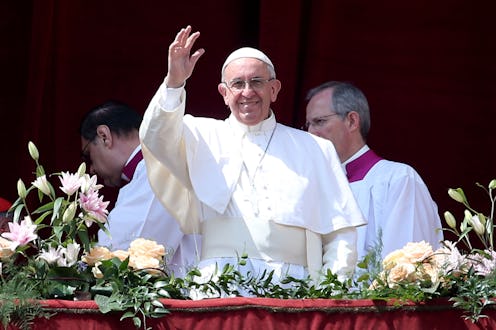
Written records suggesting that Catholic priests should remain celibate date back to the year 304, and it wasn't until the 12th century that the idea became official. But after hundreds of years of enforcement, some Catholic priests may soon be allowed to have spouses. According to several news reports, Pope Francis might consider letting married men be priests in certain parts of the world.
Due to a reported shortage of Roman Catholic priests in the Amazon region of Latin America, the leader of the Catholic Church has reportedly agreed to allow for debates — and potentially a vote — on the topic of required celibacy for church leaders in affected parts of South America. The discussion will take place at an upcoming regional meeting of Amazonian Bishops.
Formally called viri probati (translated to "tested men"), these priests could help fill gaps in leadership in the region. And reportedly it's a shortage that desperately needs to be filled. According to some estimates, there might be as few as one priest for every 10,000 Catholics in the Amazon region. If married men in the area are allowed to be ordained, the exception would only apply to certain regions.
As of now, virtually all Latin Catholic priests are required to remain celibate. There are some exceptions to the celibacy rule, such in the case of married Protestant clergymen who convert to Catholicism. But by and large, it is not allowed. The reasoning is reportedly theological and canonical (based on religious law). Several verses in Christian scripture say that remaining unmarried allows a person to focus more closely on their religious practices, or allude to celibacy as more closely aligned to some perceptions of Heaven. But, the rule is not hard and fast across all interpretations of Christianity. Virtually all Protestant denominations allow their leaders to be married and have children, whether or not they were married before being ordained.
Reportedly, the Pope's agreement to allow the debates to take place is a result of Cardinal Claudio Hummes, the president of the Episcopal Commission for the Amazon, requesting that the pontiff ordain married men from the region. Men who are single when they are ordained would reportedly be required to stay unmarried.
Pope Francis has become known as the relatively liberal leader of a generally conservative religious institution. Frequently, he has been cited suggesting that age-old traditions and rules be lifted or altered. He has been open to discussing previously taboo subjects like birth control, LGBTQ rights, and even abortion. Allowing conversations to take place regarding potentially married priests is only the latest eyebrow-raising move by the church leader.
Back in March, Pope Francis made headlines when he broached the subject in an interview with the German newspaper Die Zeit. In the interview, the Pope reportedly pointed out that letting married men be ordained simply might make sense in rural, remote parts of the world.
“We must consider if viri probati is a possibility,” he said. “Then we must determine what tasks they can perform, for example, in remote communities.”
According to The Telegraph, Pope Francis does broadly believe that celibacy among most Catholic priests should continue. But even while believing this, he thinks that church leaders should be open to considering alternatives, when it is in the best interest of the church and its members.
Vatican official Monsignor Erwin Krautler has reportedly echoed the Pope's sentiments. Krautler encouraged the topic of married priests be discussed at the 2019 Special Assembly of the Synod of Bishops for the Pan-Amazonian Region, according to the Mirror. (A synod is exactly that — an official meeting of bishops.) Representatives will convene from nine countries: Brazil, Colombia, Ecuador, Guyana, Peru, Surinam and French Guyana, Bolivia, and Venezuela.
While allowing a debate on the subject doesn't guarantee that married men in the Amazon region will be allowed to join the priesthood, it does signal yet another Papal move toward loosening previously strict rules. It also opens the door for potentially allowing married men to become priests in other remote areas of the world. If anything, it's certainly a step toward increased individual freedom within a church that has hundreds of years of very conservative history.